|
|
|
Sort Order |
|
|
|
Items / Page
|
|
|
|
|
|
|
| Srl | Item |
| 1 |
ID:
196196


|
|
|
|
|
| Summary/Abstract |
Why is it important to understand the potential of circular economy for security? With the green transition in full swing and vulnerabilities in value chains as a consequence of the COVID–19 pandemic and Russian aggression towards Ukraine, this question has never been more timely.
Titanium metal constitutes a poignant case, as it is a critical raw material essential for the strategic civil aerospace and defence sectors. In addition, circular economy solutions constitute a viable solution to mitigate import dependencies in the case of this particular raw material.
The European Union, with one of the largest aviation industries globally, is dependent on titanium imports from Russia and the United States. The latter, in turn, (re)imports titanium scrap from EU aviation manufacturing to increase material efficiency and reduce costs through recycling.
Based on extensive stakeholder interviews across several countries and quantitative trade data, this article presents a first-time analysis of how, in the case of the titanium value chain, circular economy solutions can support the EU Open Strategic Autonomy (OSA) objectives, as enshrined in the 2023 Critical Raw Materials Act.
|
|
|
|
|
|
|
|
|
|
|
|
|
|
|
|
| 2 |
ID:
196204


|
|
|
|
|
| Summary/Abstract |
The relationship between populism and free trade has historically been a complex one. This article argues that populism affects trade not by expressing consistent economic preferences, but by operating as a discourse that articulates external policies as a struggle for popular recognition. We analyse trade discourses of Donald Trump and Brexiteers following their victories in the 2016 United States presidential election and the referendum on European Union membership in the United Kingdom. These populist movements expressed opposing trade preferences: Trumpism was identified with protectionism, while Brexiteers supported free trade. However, they both articulated trade as a way to regain popular sovereignty from elites and hostile outsiders. A discursive approach helps identify a common logic in how populists articulate foreign relations despite pursuing nominally opposing policies. While this populist logic pertains primarily to domestic mobilization, it has implications for the international order as well, as evidenced in the persistence of protectionist instincts in the US under President Biden and the acceptance of a ‘global’ trade policy outside the EU as the new frame of reference for UK external economic relations.
|
|
|
|
|
|
|
|
|
|
|
|
|
|
|
|
| 3 |
ID:
155478
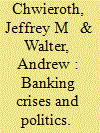

|
|
|
|
|
| Summary/Abstract |
Were the extensive policy responses of many governments to the financial crises of 2007–9 and the political events that have followed them exceptional? We show that over the course of nearly 150 years, severe banking crises have become more consequential for policy and politics in democracies than ever before. First, governments have become much more likely over time to opt for extensive bailouts and other policies aimed at wealth protection during crises. Second, the inclination of voters to punish governments that are in office when crises occur has also increased sharply over time. We argue that the main cause of both developments is the rise of ‘great expectations’ among large segments of society in modern democracies regarding public responsibility for the protection of wealth in the post-1945 era. Especially since the 1970s, severe banking crises returned and have posed a growing threat to this wealth and thus to the prospects of many households, including large segments of the ‘middle class’. This rising ‘mass pressure from below’ on governments to secure household wealth has provided an important source of pressure on policymakers to respond with increasingly costly bailouts, with powerful and ongoing political consequences.
|
|
|
|
|
|
|
|
|
|
|
|
|
|
|
|
| 4 |
ID:
167115
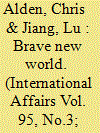

|
|
|
|
|
| Summary/Abstract |
China's ties with Africa are evolving into a multi-faceted relationship of increasing complexity. After nearly two decades of debt-financed infrastructure development, Beijing's exposure to African debt is reaching disquieting proportions with an estimated US$132 billion owed to China in 2016. Managing this new role as Africa's creditor poses uncomfortable questions for creditor and debtor alike. Concurrently, the quiet surge of Chinese investment in manufacturing in Africa is transforming local economies in ways that are beginning to alter the continent's position within the global economy. Finally, the proliferation of Chinese businesses and migrants across Africa is inspiring greater Chinese involvement in UN peacekeeping and private security initiatives.
|
|
|
|
|
|
|
|
|
|
|
|
|
|
|
|
| 5 |
ID:
157973
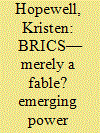

|
|
|
|
|
| Summary/Abstract |
The much hyped rise of the BRICS (Brazil, Russia, India, China and South Africa) has lately been met with equally fervent declarations of their demise. Amid slowing growth in many of these countries, the prevailing view now appears to be that the rise of the BRICS was little more than an illusion. In this article, however, I contest this assessment by arguing that the emerging powers were never solely, nor most importantly, merely an economic phenomenon. Instead, I show that emerging powers—specifically Brazil, India and China—have become an important political force in the global trading system and have had a profound and lasting impact on the World Trade Organization (WTO). Contrary to the widespread assumption that these countries are too diverse to ally, I argue that the emerging powers displayed a remarkable degree of unity and cooperation, working in close concert to successfully challenge the dominance of the US and other established powers. As evidenced by the collapse of the Doha Round, the collective rise of Brazil, India and China substantially disrupted the functioning of one of the core institutions of the liberal economic order created under US hegemony.
|
|
|
|
|
|
|
|
|
|
|
|
|
|
|
|
| 6 |
ID:
170401
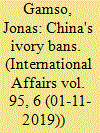

|
|
|
|
|
| Summary/Abstract |
China has been a major market for elephant ivory for centuries. However, the Chinese government recently enacted bans on imports and exports of ivory (2015) and on the domestic ivory trade (2017). These bans appear to have come in response to intensive influence campaigns and public shaming from domestic and foreign activists, who cited declining elephant populations and highlighted China's role. However, this shaming-narrative is at odds with conventional wisdom regarding Chinese policy-making: China typically resists international pressures and its authoritarian government is thought to be largely insulated from domestic efforts by civil society groups. This article reconciles Beijing's ivory policy with these conventional beliefs about policy-making in China. I argue that the Chinese government saw unique benefits to banning the ivory trade, under growing international scrutiny, as doing so enhanced Chinese soft power while having very little impact on its sovereignty or development. Non-government organizations (NGOs) operating both inside and outside of China played a role as well: NGOs in China helped to shift Chinese public opinion towards favouring the bans, while those operating abroad led public relations efforts to publicize Chinese demand for ivory to foreign audiences. Efforts by the latter group of NGOs intensified pressure on the Chinese government to rein in the ivory market, while increasing the soft power benefits that banning ivory would bring to Beijing.
|
|
|
|
|
|
|
|
|
|
|
|
|
|
|
|
| 7 |
ID:
170403
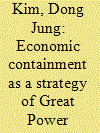

|
|
|
|
|
| Summary/Abstract |
Economic containment has garnered repeated attention in the discourse about the United States' response to China. Yet, the attributes of economic containment as a distinct strategy of Great Power competition remain unclear. Moreover, the conditions under which a leading power can employ economic containment against a challenging power remain theoretically unelaborated. This article first suggests that economic containment refers to the use of economic policies to weaken the targeted state's material capacity to start military aggression, rather than to influence the competitor's behaviour over a specific issue. Then, this article suggests that economic containment becomes a viable option when the leading power has the ability to inflict more losses on the challenging power through economic restrictions, and this ability is largely determined by the availability of alternative economic partners. When the leading power cannot effectively inflict more losses on the challenging power due to the presence of alternative economic partners, it is better off avoiding economic containment. The author substantiates these arguments through case-studies of the United States' responses to the Soviet Union during the Cold War. The article concludes by examining the nature of the United States' recent economic restrictions against China.
|
|
|
|
|
|
|
|
|
|
|
|
|
|
|
|
| 8 |
ID:
170391
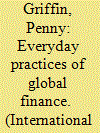

|
|
|
|
|
| Summary/Abstract |
This article argues that practices of global finance provide a rich opportunity to consider gender's embodiment in everyday, but highly regulatory, financial life. Tracing a pathway through the rise of the ‘diversity agenda’ in global finance in the wake of the global financial crisis, the article asks how ‘diversity’ has shaped the global financial services industry, and whether it has challenged the reproduction of gendered power in global finance. Recent, innovative feminist political economy work has laid out a clear challenge to researchers of the global political economy to explore how everyday practices have become significant sites of gendered, regulatory power, and this article takes up this challenge, analysing how the rise of ‘diversity’ in financial services reveals the crucial intersections of gendered power and everyday economic practices. Using a conceptual framework drawn explicitly from Marysia Zalewski's work, this article advances critical inquiry into how gender has become an often unacknowledged way of writing the world of global finance, in ongoing, and problematic, ways. It proposes that the practices and futures of the diversity agenda in global finance provide a window into the persistent failure of global finance to reconfigure its foundational masculinism, and asks that financial actors begin to take seriously the foundational, gendered myths on which global finance has been built.
|
|
|
|
|
|
|
|
|
|
|
|
|
|
|
|
| 9 |
ID:
170393
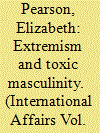

|
|
|
|
|
| Summary/Abstract |
It is more than 20 years since Marysia Zalewski and feminist scholars posed ‘the man question’ in International Relations, repositioning the gaze from female subjectivities to a problematization of the subjecthood of man. The field of masculinity studies has developed this initial question to a deep interrogation of the relationship between maleness and violence. Yet public and policy discourse often reduce the complexity of masculinities within extremism to issues of crisis and toxicity. Governments have prioritized the prevention of extremism, particularly violent Islamism, and in so doing have produced as ‘risk’ particular racialized and marginalized men. This article asks, what are the effects of the toxic masculinity discourse in understanding the British radical right? It argues that current understandings of extremism neglect the central aim of Zalewski's ‘man’ question to destabilize the field and deconstruct patriarchy. They instead position Islamophobia—which is institutionalized in state discourse—as the responsibility of particular ‘extreme’ and ‘toxic’ groups. In particular, the article outlines two ways in which ‘toxic masculinity’ is an inadequate concept to describe activism in the anti-Islam(ist) movement the English Defence League (EDL). First, the term ‘toxic masculinity’ occludes the continuities of EDL masculinities with wider patriarchal norms; second, it neglects the role of women as significant actors in the movement. Using an ethnographic and empathetic approach to this case-study, the article explores how Zalewski's theoretical position offers a route to analysis of the ways in which masculinities and patriarchy entwine in producing power and violence; and to a discussion of masculinities that need not equate manhood with threat.
|
|
|
|
|
|
|
|
|
|
|
|
|
|
|
|
| 10 |
ID:
187645
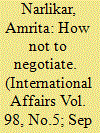

|
|
|
|
|
| Summary/Abstract |
Trade multilateralism would not have featured as a case of ‘abject failure’ had this special issue been planned in 2001. But since then, the World Trade Organization (WTO) has unfortunately become an almost perfect example of how not to negotiate, even when one takes into account the limited successes of the 12th ministerial conference in June 2022. This article proceeds in four steps. The first section outlines the multiple levels of malfunction and breakdown in the organization. The second part argues that a variety of negotiation failures are responsible for the dire straits in which the WTO finds itself today. I identify three broad categories of bargaining failures in this member-driven organization: negotiation mishaps that have led to the Doha deadlocks; negotiation muddles that members have got themselves into while updating the institutional practices of the WTO; and failures on the part of the membership to find negotiated solutions to new systemic challenges. The third section reflects on the interaction of my own research with the world of policy. The fourth and concluding section presents the main ‘Dos’ and ‘Don'ts’ that follow from the analysis, and offers some further policy recommendations.
|
|
|
|
|
|
|
|
|
|
|
|
|
|
|
|
| 11 |
ID:
187644
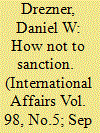

|
|
|
|
|
| Summary/Abstract |
In the past century economic sanctions have emerged as a prominent ‘off the shelf’ tool of diplomacy. This article examines two of the most high-profile failures in the history of economic sanctions: the United Nations sanctions against Iraq between the two Gulf wars, and the Trump administration's re-imposition of sanctions on Iran beginning in 2018. The technology of economic statecraft changed considerably between these two cases, indicating significant policy learning. In both instances, however, the sanctions imposed crippling costs on the target state without any observable concessions. In neither case was the primary goal achieved, and the negative policy externalities were considerable. An autopsy of these failures reveals three cautionary warnings. First, the recipe for sanctions success is not merely a function of the ability to impose costs on the target state. Second, an underappreciated impediment to the successful use of economic statecraft is a failure to articulate clear and consistent demands. Third, tight linkages between scholars and policy-makers can lead to improved policies in the short term, but long-term political imperatives within great powers can pervert such successes.
|
|
|
|
|
|
|
|
|
|
|
|
|
|
|
|
| 12 |
ID:
196213


|
|
|
|
|
| Summary/Abstract |
What are the key social forces and interests that underpin an emerging multipolar world? Existing research oscillates between the retreat of the liberal international order and the rise of the rest, which remains trapped in a form of geopolitical fetishism. These explanations tell us little about the kinds of forces that are driving a more fragmented and disordered global order. In this article, we suggest going beyond this by fleshing out the underlying social class relations that this new emerging order is based on. At the core of it is the emergence of a new business class—fraction of capital—that in turn sustains what we call competing regulatory geographies. The latter are internalized within state institutions and policies and have reconsolidated a combination of state and market-led industrial policy. Empirically, we also show how these dynamics unfold in key non-core states. In highlighting this particularly potent dynamic of the contemporary global order, this article calls for policy-makers to better recognize the internal contestation within states that shapes and is shaped by combined capitalist development.
|
|
|
|
|
|
|
|
|
|
|
|
|
|
|
|
| 13 |
ID:
168425


|
|
|
|
|
| Summary/Abstract |
In this article, we examine China's promotion of the renminbi (RMB) in international oil trade and explore its implications for the international currency system in the short and the long term. The article traces the rise of the RMB in international oil trade in recent years and provides an analysis of its impact on the internationalization of the Chinese currency. We argue that despite the increasing use of the yuan in oil trade in recent years, in the short term it is highly unlikely that a petro-RMB system will emerge to rival the petrodollar system. Unlike the petrodollar, which combines the qualities of a master currency, a top currency and a negotiated currency, China lacks the economic leadership and the political and geopolitical leverages to make the RMB a major petrocurrency. Although the emergence of the RMB-denominated Shanghai oil futures is an important development, the absence of highly developed financial markets and a strong legal system in China hinders its potential. In the long run, the RMB may take on a more prominent role in the international oil trade as China's weight as an oil importer rises. More importantly, the overuse of financial sanctions by the US government has begun to undermine the role of the dollar within and beyond the oil trade. In addition, the rise of alternative energy sources will diminish the centrality of oil in the world economy, thus reducing the significance of petrocurrencies—whether the dollar or the RMB—in shaping the international currency system.
|
|
|
|
|
|
|
|
|
|
|
|
|
|
|
|
| 14 |
ID:
167123
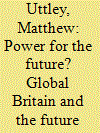

|
|
|
|
|
| Summary/Abstract |
This article explores how the United Kingdom Ministry of Defence's (MoD) institutional vision of the potential future character of conflict is reflected in current defence policy decision-making and future force development planning. On the face of it, institutional arrangements in the MoD suggest that the results of ‘horizon-scanning’ and ‘futures’ analysis guide long-term defence planning in the design and development of the UK's future military roles and force structure. Our analysis points to the opposite. It suggests that it is the unchallenged assumption that the UK will remain a ‘Tier One’ defence power capable of deploying military power on a global scale and the MoD's long-term planning cycle that shape long-range forecasts of the future operating environment, rather than the other way round. Our explanation for this inversion is derived from the ‘New Institutionalism’ approach to public policy analysis. In taking this approach, we suggest that the outcomes of UK defence policy formation are strongly influenced by path dependency in the form of baked-in institutional ideas about the ‘appropriate’ role of Britain as a military power (‘what should be done’), along with historical capability investments underpinning UK defence that are costly to reverse (‘what can be changed’). By extension, we argue that if these embedded path dependencies explain the development of previous and current UK defence policy, then it should come as no surprise that the current ends, ways and means in UK defence are projected forward in the MoD's institutional view of potential future operating environments, resulting in limited change within established paths.
|
|
|
|
|
|
|
|
|
|
|
|
|
|
|
|
| 15 |
ID:
165028


|
|
|
|
|
| Summary/Abstract |
From the standpoint of international economic relations, the key implications of the Versailles Treaty were as follows. Signatories committed their countries to reconstructing a free and open multilateral trading system such as had existed before the First World War. Other economic institutions and arrangements, as distinct from the trading system, were noteworthy only to the extent that they worked towards this paramount goal. Moreover, in so far as those other arrangements, starting with the gold standard and international financial relations, had been integral to the success of the prewar trading system, there was a presumption that they too should be reconstructed along prewar lines. This approach was subject to multiple conflicts and contradictions. It did not take account of how the economic world had changed, creating a mismatch between prewar institutions and postwar circumstances. It enshrined—indeed, it gave legal content to—the conventional wisdom that to the victor go the economic spoils by imposing that self-same reparations burden on Germany and the other defeated Central Powers. It highlighted the conflicted nature of American attitudes towards management of the international economic system. And it did not give the Soviet Union, ultimately to emerge as the second of the twentieth century's two Great Powers, a seat at the table. While seeking to avoid exaggerating the parallels, I argue that the structure of international economic relations in the wake of the Cold War resembles in important respects the structure of those relations after the First World War.
|
|
|
|
|
|
|
|
|
|
|
|
|
|
|
|
|
|
|
|
|